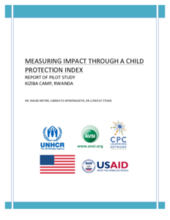Measurement methods to assess the strength of child protection systems in humanitarian settings are lacking. Creating an evidence base for protection programming for children, including SGBV, is difficult. Traditional impact assessment methodologies are often not feasible or appropriate in humanitarian or displacement contexts. A lack of rigorous and robust methods and tools to measure the outcomes associated with child protection programming in humanitarian settings limits the ability to measure the results of UNHCR’s programming and the impact of its new strategies.
In response to these challenges, and in recognition of the need to develop and pilot assessment approaches and measurement methods for child protection in humanitarian settings, UNHCR, the CPC Network, and AVSI Rwanda collaborated on this pilot study, “Measuring Impact through a Child Protection Index.” This report presents the methodology, findings and key learnings of the pilot study in Kiziba camp, Rwanda. Kiziba Camp was established in December 1996, and currently has a population of 16,314, including 8,163 children aged 0-17 years old (3,993 boys and 4,170 girls).

